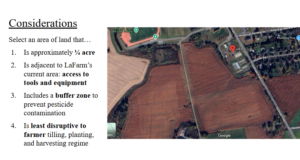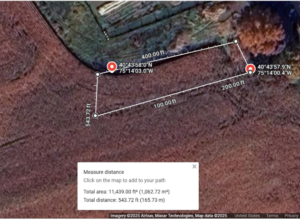- January 2025
- Getting access to land: Designing a compelling proposal and communicating with the individual in charge of negotiating lease terms with the conventional farmer.
- February 2025
- Designing a syllabus: Creating a list of learning goals, selecting readings– research articles and a book, making a structure for field work.
- Beginning the research with readings, writing memos to synthesize information and learning gains.
- March 2025
- Meeting with the conventional farmer to discuss the proposed study area and reworking it to accommodate his operations.
- Continuing the readings and memos.
- April 2025:
- Taking soil samples to be analyzed at Cornell Soil Health Lab.
- Presenting work at 3rd Annual Northeast Student Food and Farm Conference.
- Field work: setting up deer fence, flail mowing corn debris, broadcasting cover crop seed, incorporating seed with precision depth roller.
- May 2025
- Presenting research at Sustainability Community Meeting.
- Monitoring growth of cover crop.
- August 2025
- Flail mow spring cover crop.
Category: The Study
A compelling budget proposal was key to securing funding for the technical part of this independent study. While I have an innate passion for regenerative agriculture, the people on the recieving end would only care about regenerative agriculture if I could demonstrate how this independent study contributes to my educational experience at Lafayette. I leveraged the college’s mission statement and pointed out how my study would not just benefit me, but also contribute to the college as a whole.
Regenerative Agriculture Budget Proposal: March 2025
Introduction:
My name is Olivia Simione, and I am a junior majoring in Environmental Science with a Spanish minor. I have worked on LaFarm for the past 3 years and graduated from the Apprenticeship program. My practical experience on LaFarm, in addition to my courses, has informed me about how to manage land sustainably and what it takes to do so. This project is an opportunity to put what I have learned into practice.
Description:
This independent study is a project that will investigate the benefits of transitioning land from a conventional agriculture model to a regenerative agriculture model by focusing on minimizing soil disturbance, maintaining vegetative soil cover, eliminating the use of synthetic agricultural chemicals, and maximizing diversity. A soil health assessment through the Cornell Soil Health Laboratory would serve as a baseline measurement of pH, Organic Matter, Nutrient profiles for P, K, Mg, Fe, Mn, Zn, Al, Ca, Cu, S, B, Soil Texture, Active Carbon, Wet Aggregate Stability, Soil Respiration, Soil Organic Carbon, Total Carbon, and Total Nitrogen. This assessment will be compared to past soil health assessments of LaFarm to evaluate the relative soil health of a land under conventional practices to land under sustainable practices. Following this initial assessment, the implementation of agricultural practices used in regenerative systems will begin. Stakes and a deer fence will be established around the perimeter of the working area to prevent animals from damaging the crops that will be grown. LaFarm’s 2-wheel tractor will be used with the Precision Depth Roller implement as a low-till method of preparing the soil for sowing cover crops. The cover crops will serve as a natural way to replenish nutrients without the use of synthetic chemicals and also serve as a vegetative cover.
Benefits to the College:
- Uphold Lafayette’s Mission: “The College fosters intellectual inquiry, artistic exploration, scholarship, and personal growth in a vibrant, diverse, and inclusive community. Lafayette students become critical thinkers, creative problem-solvers, and responsible citizens of the world.”
- Contribute to Lafayette’s Climate Action Plan: Supports two of the three main goals of the climate action plan: 1) utilize regenerative ecosystems and biodiversity, 2) zero waste and circular economics.
- Raise Lafayette’s profile across other schools in the region: Enhances leadership in sustainability, food systems, and campus farms
- Creates a space for more student research, sustainability projects, and food systems reform
- Connect curricular activities of various departments to community engagement work:
- Departments: EVST, Biology, Geology, A&S, History, Gov/Law, and more
- Classes: Land Acts, Food Studies, Intro to the Environment, Environmental Justice, Geomorphology, and more
Estimated Budget
| Soil Health Assessment | $130 + shipping |
| Spring Green Manure Cover Crop Seed | $86.50 |
| Deer fence | $450 |
| Stakes | $243 |
| Total | $909.5 + shipping |
EVST 390-02: Regenerative Agriculture at LaFarm
Learning objectives:
- What is regenerative agriculture? What does it mean to practice regenerative agriculture?
- What is the discourse surrounding regenerative agriculture?
- How does regenerative agriculture differ from other sustainable agricultural practices?
- What does it mean to regenerate land?
- What are the Indigenous origins of regenerative practices and how may the popularized version of regenerative agriculture differ on a practical and psychological level?
EVST 390-02: Regenerating(?) Land
| Week/Topic | Reading/Viewing/Activity | Deliverable Due |
| Week 1: Jan 27-31 |
|
|
| Week 2: Feb 3-7
PASA Conference Introduction to Regenerative Agriculture
|
|
|
| Week 3: Feb 10-14
Introduction to Regenerative Agriculture:
|
|
|
| Week 4: Feb 17-21
Introduction to Regenerative agriculture:
|
|
|
| Week 5: Feb 24-28
Re-group |
|
|
| Week 6: Mar 3-7
Soil Testing: |
|
|
| Week 7: Mar 10-14
Soil Testing: -collect soil sample and ship to Cornell |
Field Work:
|
|
| Spring Break: Mar 17-21 | ||
| Week 8: Mar 24-28: |
|
|
| Week 9: Mar 31-Apr 4 |
|
|
| Week 10: Apr 7-11 |
|
Memo
|
| Week 11: Apr 14-18 |
|
Memo
|
| Week 12: Apr 21-25 |
|
|
| Week 13: Apr 28- May 2 |
|
|
| Week 14: May 5-9 | Work on Portfolio | |
| Week 15: May 16 | Complete Portfolio |
Considerations when selecting an area:

Approximate area:
